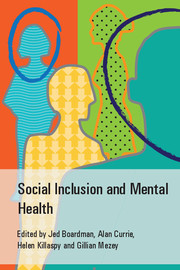Book contents
- Frontmatter
- Contents
- List of contributors
- List of tables, boxes and figures
- Foreword
- Preface
- Acknowledgements
- Scoping Group on Social Inclusion, Royal College of Psychiatrists
- Part 1 What is social exclusion?
- Part 2 Social exclusion: the scope of the problem
- Part 3 Working towards inclusive psychiatry
- Index
Foreword
Published online by Cambridge University Press: 01 January 2018
- Frontmatter
- Contents
- List of contributors
- List of tables, boxes and figures
- Foreword
- Preface
- Acknowledgements
- Scoping Group on Social Inclusion, Royal College of Psychiatrists
- Part 1 What is social exclusion?
- Part 2 Social exclusion: the scope of the problem
- Part 3 Working towards inclusive psychiatry
- Index
Summary
Being part of society, contributing to it and, in return, being recognised and acknowledged, is a core need of human beings. The impact of social factors, whether they be isolation, unemployment, poor housing, financial hardship or debt, in the aetiology of mental and physical ill health and their role in its management cannot be underestimated. Whether an individual is egocentric or socio-centric, social inclusion is of great significance in ensuring that an individual feels part of the larger community. Mentally ill individuals often seek employment, housing and social contacts as their key priorities and it is essential that clinicians do not forget these goals. There is little doubt that social inclusion is often seen as a political or moral concept, but it is much more than that: it is a quintessential basic need that every individual has, to be accepted and to have the self-esteem and the self-confidence which will allow the individual to deal with stress. Social inclusion for individuals has many meanings, depending upon gender, age, sexual orientation, educational attainment or socio-economic status, among other things. The challenge for clinicians and policy makers is to make social inclusion work and not simply to rely on rhetoric. This book is doubly welcome for highlighting an important topic and for guiding practitioners and policy makers to encourage social inclusion. The book originates from a report which was developed by Jed Boardman, and for the book he has managed to attract a many eminent contributors. I hope that it will be of interest not only to clinicians but also to stakeholders, including politicians and policy makers.
- Type
- Chapter
- Information
- Social Inclusion and Mental Health , pp. xiPublisher: Royal College of PsychiatristsPrint publication year: 2010

